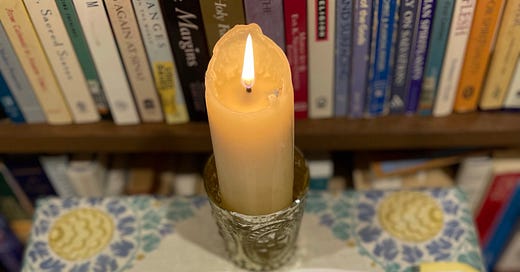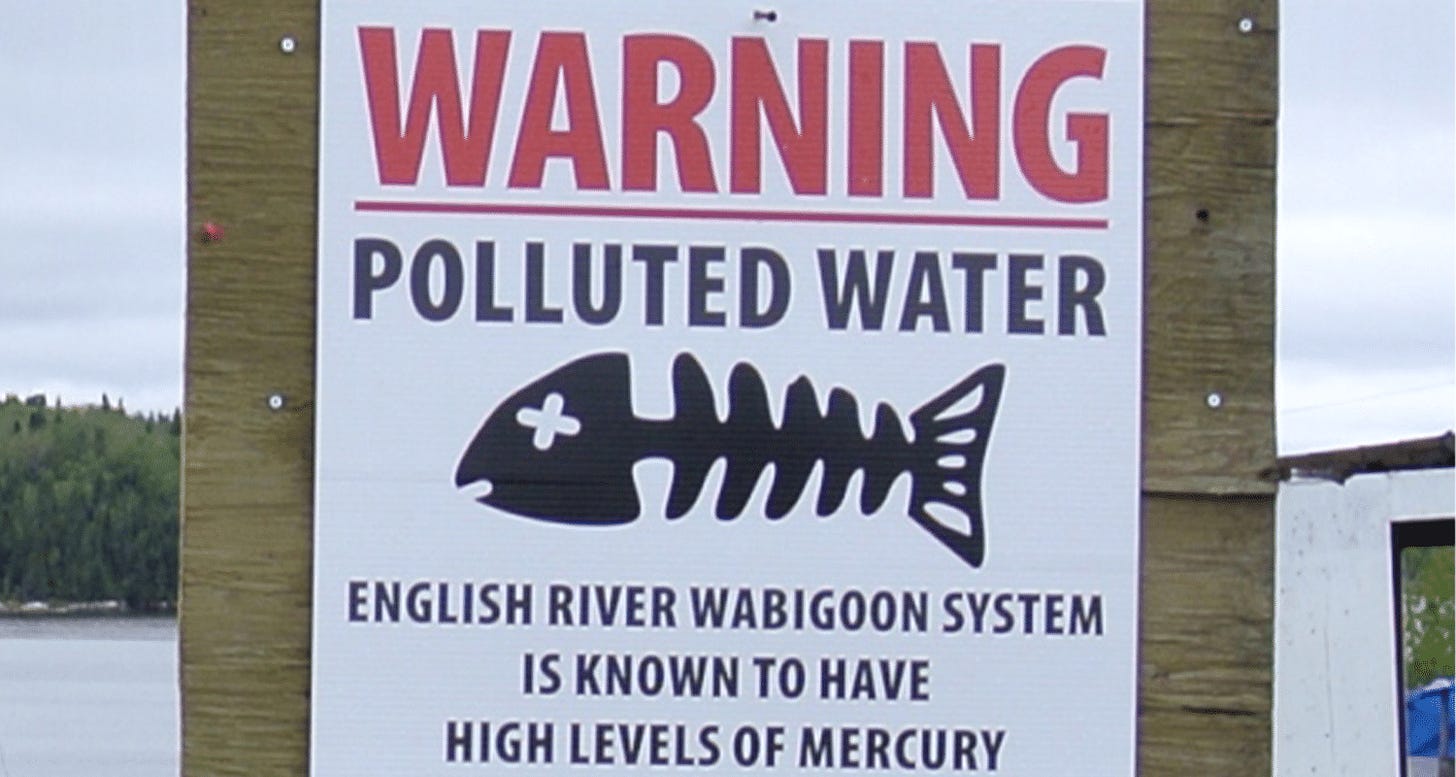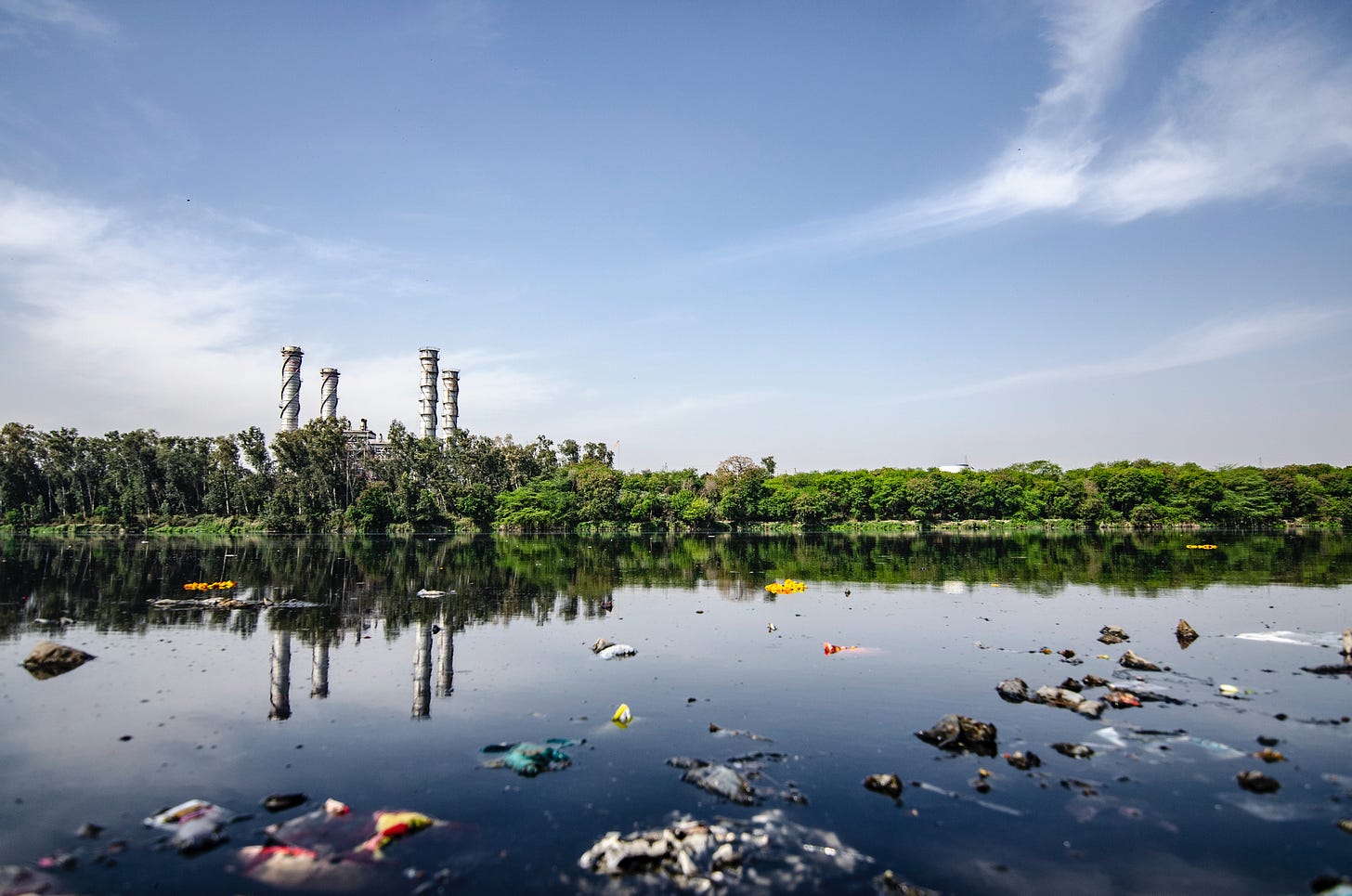Sermon: The Water Crisis: God’s Grace and Mercy in Our Contradictions
On the global water crisis, the contradictions between what we want for the world and our everyday use of water, and the need for God's grace and mercy. (Matthew 10:40-42)
Welcome! I am Jessica Hetherington, and this newsletter is about faith and climate action. You can subscribe by clicking here:
Sermon
The Water Crisis: God’s Grace and Mercy in Our Contradictions
40 ‘Whoever welcomes you welcomes me, and whoever welcomes me welcomes the one who sent me. 41 Whoever welcomes a prophet in the name of a prophet will receive a prophet’s reward; and whoever welcomes a righteous person in the name of a righteous person will receive the reward of the righteous; 42 and whoever gives even a cup of cold water to one of these little ones in the name of a disciple—truly I tell you, none of these will lose their reward.’ (Matthew 10:40-42, NRSV)
Let us pray:
God of Life,
May the words of my mouth
And the meditations of all our minds and hearts
Lead us to deeper understanding of you
And the love you call us to live. AMEN.
Mmm. How I love a sip of cold water on a hot day like this! Sometimes when Mark or I am working outside in the summer, we will bring the other person a tall glass of ice water. Nothing tastes so good, sometimes, right? Maybe yesterday, on Canada Day, if you were outside, you know what I’m talking about.
Maybe it’s because it’s summertime now and it’s hot outside, but I am drawn to the last verse in our Gospel reading from today. Jesus says, “And whoever gives even a cup of cold water to one of these little ones in the name of a disciple - truly I tell you, none of these will lose their reward” (Matt. 10.42).
You may recall what I have said about such everyday ordinary images in our holy Scriptures; the writers use the things of daily life at that time to make us think about what God is saying and doing. They use the ordinary to explain or point to the extraordinary. Here, cold water, an ordinary drink, is used to describe the way in which we are to serve each other, and how in doing so we are serving Jesus himself.
I mean, you can imagine how important a cup of cold water would be in ancient Judea, can’t you? We know how hot and dusty it would have been in the Middle East then; it is the same today. Then, people would travel distances on foot or by animal in the dry, hot weather. They might bring water with them, but it wouldn’t be cold or necessarily fresh. Fresh, cold water would be a welcome relief, indeed.
And of course, this verse isn’t even talking about giving cold water to anyone, but particularly to the “little ones,” the people who were marginalized. The people who were suffering. The people who would have the least access to cold water, and would often be last in line.

“Whoever welcomes you welcomes me, and whoever welcomes me welcomes the one who sent me” (Matt. 10.40). Giving a cup of cold water to “these little ones” is one way that this first verse is lived out in a discipleship of following Jesus. It’s like giving a cup of water to Jesus.
It is easy for us to imagine how the image of cold water in ancient Judea would be a powerful one for Jesus to use to describe what it means to follow him. If you think back to whatever you were doing yesterday for Canada Day, you can think of how good a cold cup of water would or did feel.
That same image works just as well for today. Here and around the world, not everyone has easy and free1 access to cold water. Or clean water. Or water from a tap inside their home. Or have enough water to drink, cook, and wash clothes and body. Here and around the world, there is a water crisis that affects every single level of society.
We are in a water crisis that is compounded by and at the center of the climate crisis.2 There is water scarcity around the world, where two billion people lack access to safe drinking water, and about half of the world’s population experiences “severe water scarcity for at least part of the year.”3 Only half a percent of the water on Earth is freshwater that is both available and useable; the climate crisis is threatening that supply. The water supplies that are stored in glaciers and snow cover are expected to decline over the course of the century. Sea-level rise will lead to freshwater becoming contaminated with salt, and thus undrinkable. The more that global heating rises, the worse it will all get.
And as many of us know, this isn’t just an ‘over-there’ issue; in Canada, there are more than 28 long-term drinking water advisories in First Nations communities, and “73 percent of First Nations’ water systems are at high or medium risk of contamination.”4
So, we all know what to do, don’t we? We know that we need to act on behalf of residents living in First Nations communities, and the global poor who suffer from water scarcity. We know that we have to work to limit global heating to 1.5 degrees Celsius; we know there are solutions that can be taken. We know that we can “give even a cup of cold water to one of these little ones,” either through donating to a charity, writing to the government and voting in politicians who will work to fix the water crisis in First Nations communities, and more.
Yet, this isn’t enough, is it? This isn’t the only thing that Jesus is telling us in this passage. Not really. For discipleship is about more than what we do for others; it is also about how we ourselves are living, too.
Earlier this week, I was listening to an interview with Nadia Bolz-Weber. Nadia is a New York Times bestselling author, ordained Lutheran pastor, and recovering alcoholic.5 She describes herself as someone who messes up every day, and so needs God’s grace and mercy, every day. She uses much more colourful language to describe this, but I’m keeping this sermon PG.
In the interview, Nadia says that she doesn’t need to hear a sermon that tells her what the right and good thing is to do. We already know what that is. She says that she needs a sermon that will break her heart open, and make her experience the grace of God that we all need to experience.
When I heard that, I was convicted. Don’t get me wrong; I do believe that we need to be reminded of what the good and right things are to do in the world today, as followers of Jesus. Sometimes, it isn’t so clear. But on something like the water crisis, once I point it out, it is really, really clear! Water is a human right, and it is our collective responsibility to make sure that everyone in this world, absolutely everyone, has free and easy access to safe drinking water.
“Whoever welcomes you welcome me, and whoever welcomes me welcomes the one who sent me.”
But what about how we use water, right now? What about those of us who have tons of easy and free access to water right now? How are we using the water, the fresh and - so far - freely available water that runs from the taps in our kitchens and hoses, from the taps here in the church, from the water fountains in the mall?
Here in Canada, we have nearly 7% of the water’s renewable freshwater supply.6 The Great Lakes contain almost 20% of the world’s surface freshwater.7 This is incredible! Yet they too are at risk from the climate crisis.
But how are we using that water? What are we using it for? How much is for drinking, washing our clothes and cooking our meals, and how much of it is used more flagrantly? What are we doing to protect water from contamination? Do we even know where the water in our taps comes from, and how it is treated so that it is safe?
I am guilty of wasting water. I love to have baths, more often than I need. I can often claim a ‘reason’ that I need a bath, but I confess that these reasons aren’t always really necessary. Nor do I make any efforts to conserve water; I received a free rain barrel years ago, yet it sits in our basement unused, when it could be collecting rainwater for the garden. I confess that I don’t pay attention to the water that I drink; at best I try to avoid drinking bottled water, because of the wastefulness of plastic and the problematic issue of marketing water for profit.
“Whoever welcomes you welcomes me, and whoever welcomes me welcomes the one who sent me.” Water is part of the Earth community; it is part of the creation that God made and called good. As they say, water is life. We cannot go for very long without water.
But while I know that it is right and good to ensure that everyone has access to safe, clean water, what about what I’m doing with water? What about what you’re doing with water? Is it enough to offer a cold cup of water to others, when our own use is wasteful, contributes to plastic pollution, or fosters the private sale of a common good? Is it enough to offer a cold cup of water to others, when the systems in which we operate pollute the waters around us?
My reading of this text in Matthew started off making me feel good about raising the issue of the water crisis, as though I’m not part of the problem. But my deeper reading of this text, with the help of Nadia Bolz-Weber, invites us to look not just at what more we can do for others, but about how we are currently living which is in contradiction with the needs of the world today, that are part of the ways in which we are messing up and need God’s grace and mercy.
How am I to welcome God into my life, if I abuse the water of life that God created for all the world? How can I offer a cold cup of water to the marginalized with one hand, and turn on a tap when I don’t need to, with the other? How am I hindering at the same time that I think I am helping?
How is my discipleship of climate action, in this case through ensuring free and easy access to water, contradicted by my own lack of self-reflection and awareness, and my own lack of care and boundaries around my use of water?
My friends, these questions are directed not just to me, but to all of us. We are reminded that discipleship is not easy; as we learned last week, proclaiming the Gospel will cause tension and dissension at times. We are reminded that we very often live with contradictions; they are the contradictions between who we want to be and how we want to live, and who and how we are actually living.
That we live with contradictions is completely human. This doesn’t mean that these contradictions are okay, that we can simply shrug our shoulders and say ‘Oh well, that’s just the way it goes!’ Rather the fact that we have these contradictions means that we need the forgiveness, grace and mercy of God, today and every day.
Without God’s grace and mercy, it will be well nigh impossible to begin to resolve the contradictions between how we are living and how we ought to be living. Without God’s grace and mercy, it can be impossible to hear the truth of the Gospel or the cries of the world.
The truth right now is that we are in a water crisis on both local and global levels. The truth right now is that we must ensure that everyone has free and easy access to fresh water. And the truth right now is that we must also examine our own actions with respect to water use, in order to bring them into line in a way that honours God’s good creation and the needs of the Earth community.
When we recognize both of these truths and when we admit to the contradictions that exist within ourselves between how we are living and how we ought to live, then there - right there! - is where God’s grace and mercy can break in and through us!
For we will fall down, and then we will get back up. And then we will fall down again. As Nadia says, in much more colourful language than I’m using, we humans mess up. We mess up every single day. Yet the grace of God comes into us and reminds us that we are God’s beloved children. We belong to God!
And too, we are reminded in this reading that the way back to God, the way to God through discipleship, comes to us through God’s grace, through God’s grace and mercy upon each and every one of us.
Changing the metaphor a little bit, God’s grace and mercy are, to each one of us, like a cup of cold water on a hot day. It will refresh us, will enliven us, and it will give us the energy to go out and create a world of healing, in which all within the Earth community has plenty of fresh, clean water to drink, wash, bathe, and even play in.
May it be so. Thanks be to God.
Upon hearing this sermon, my spouse argued that homeowners like us pay for water services in our city, and so the water is not ‘free’. I responded with three points: first, we are paying for the water to be piped into our home, and for the water system to be maintained. The water itself is free. Second, the fees for that usage are very small in the scheme of things. Third, we can easily find a tap in a public place anywhere in our city and fill our water bottles for free. For all intents and purposes, our water is, indeed, free.
Water – at the center of the climate crisis | United Nations. Accessed June 28, 2023.
Ibid.
Safe Water for First Nations – The Council of Canadians. Accessed June 30, 2023.
https://nadiabolzweber.com/. Accessed July 3, 2023.
NCC: Land Lines - 10 facts about fresh water in Canada. Accessed June 30, 2023.
Keeping the Great Lakes’ Freshwater Clean is a Tall Order. Accessed June 30, 2023.









